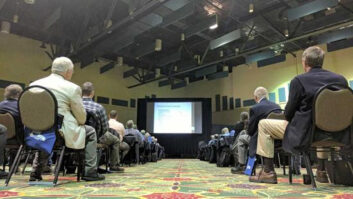Change the public file rules.
That’s the plea to the FCC from 43 state broadcast associations, which consider the rules burdensome and unfair in many ways. They’re asking the commission to suspend enforcement in the meantime.
The associations noted that the Office of Management and Budget regularly must authorize the commission to retain the rules and they would like OMB to condition approval on a partial FCC suspension. Current approval for the FCC public file system expires on Sept. 30.
“The public’s decades-long, lack of genuine interest in actually viewing the public inspection files of stations nationwide, coupled with the disproportionate enforcement penalties for violations of the PIF Rules, raise serious questions regarding whether the current PIF Rules can be justified, particularly when radio and television stations must self-disclose their PIF Rule deficiencies when they file their applications for renewal of license,” the state broadcast associations wrote to the FCC on June 17. They did not propose suspending the political time aspects of those rules.
The associations wrote that the rules were adopted more than 45 years ago and have grown in “length, scope and complexity.” A typical radio station must deal with 12 to 14 categories of documents in the files.
“All this represents a dramatic increase over time in the types of documents that stations are now required to make publicly available at their main studios. In fact, the public inspection file of a typical broadcast station is now measured in terms of the number of drawers in a file cabinet that the documents consume, even though many of the same documents are now available online on the commission’s website and are easily accessible by members of the general public.”
While the public has little to no interest in the files, the FCC has made enforcement a priority; stations must self-disclose any deficiencies at renewal time; and fines start at a “staggering” $10,000. The associations compared that to smaller fines for offenses like failure to maintain required records, committing fraud by wire, radio or television, or causing interference.
It said the FCC website shows issued or proposed fines of approximately $2 million in cases involving public file violations since 2000, with much of that involving missing documents. “Given the incongruity between the lack of public use of public inspection files on the one hand, and the high base fine amount for public inspection file deficiencies on the other hand, one is left to wonder if the commission’s ‘priority’ in enforcing its public inspection file rule is driven chiefly by revenue collection considerations!”
The broadcasters encouraged the use of online public files, though they acknowledged that converting paper to online is “not without its own thorny issues,” such as what happens if a website goes down.
The associations said they would continue to urge stations to comply with the requirements of the rules during any interim period. And they did not challenge the overall idea of requiring public access to certain documents, though they left that option open.
As an example of the public file burden, the associations said the pending merger of Citadel Broadcasting Corp. into Cumulus Media involves 37 applications. As a result, a large number of stations collectively must copy and place in their public inspection files more than 357,000 pages of application materials. “This wasteful paperwork burden is required despite the fact that the merger applications and all related materials are easily accessible on the FCC’s website.”
Related:
“Is It Time for the Public File to Go?” (May 2011)

Photo by Bob Kovacs












